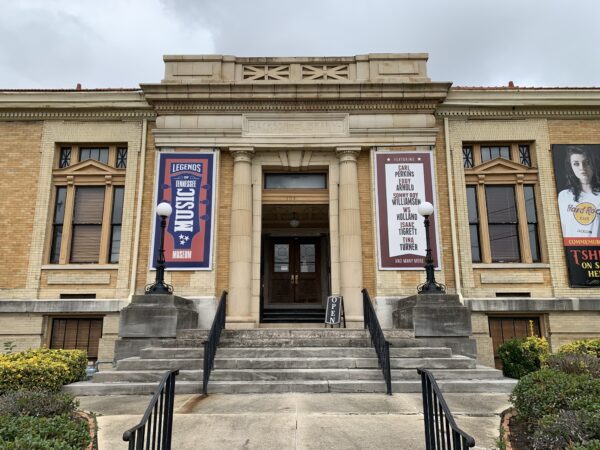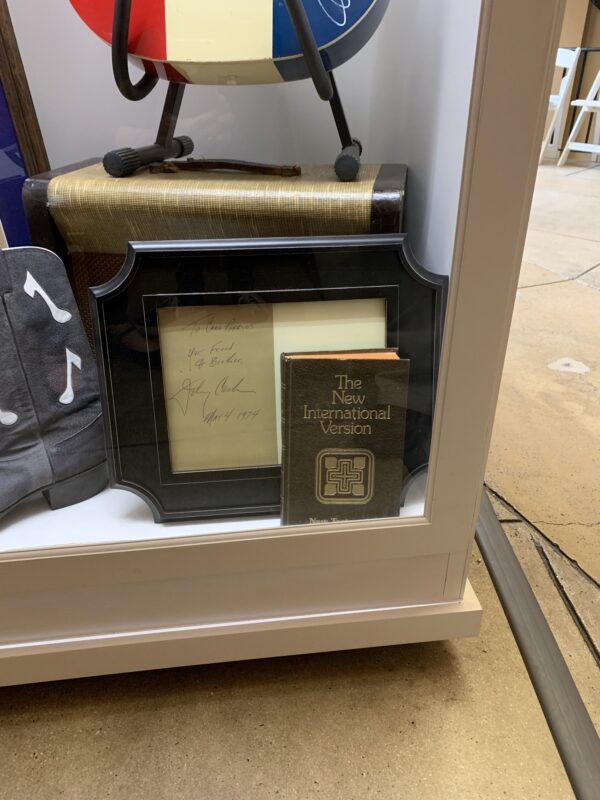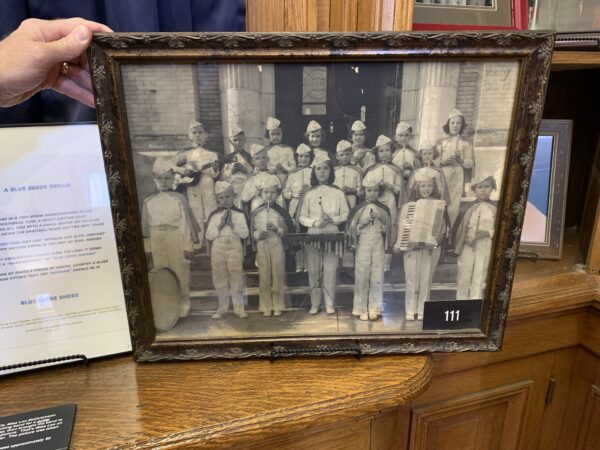Inspiring Race Relations in West Tennessee
Ray and I recently spent a few days in West Tennessee. Several experiences there encouraged me about race relations. Black people and white people have coexisted there since enslaved people worked in the region’s cotton fields. Soul, rhythm and blues, rockabilly, and jazz music all have roots in West Tennessee. John Lee Curtis “Sonny Boy” Williamson was born in Madison County. Tina Turner attended school in Nutbush. Sleepy John Estes wrote about people he knew in Brownsville. Black music in this region had a powerful impact on many white music legends, including Elvis Presley and Carl Perkins, who learned to play guitar from a black farm laborer who worked with Perkins’ sharecropper father.
A couple of years ago, Ray and I visited the Legends of Tennessee Music Museum in Jackson, located in a former Carnegie Library. Those of you who have read America the Beautiful know how special it was for Ray and me to visit another of the libraries Andrew Carnegie helped to found.


Country music legend Johnny Cash gave this New Testament to Carl Perkins in 1974.

Perkins’ 4th grade teacher Miss Lee McCutcheon
convinced him to play his guitar in the school marching band.
She bought the pants, sash, and a cap he needed for his uniform.
Miss McCutcheon brought the band to Jackson on a field trip
where this picture was taken on the front steps of the Carnegie Library
that now houses the museum. Carl is on the left in the back row.
To say that race relations in West Tennessee have been rocky in the past is a gross understatement. The fact that Martin Luther King Jr. was in Memphis because of a sanitation worker strike when he was killed at the Lorraine Motel is only one of too many examples.
We all need to believe the reality that people are people and that we are all made in God’s image. King looked forward to a day when his four little children would live in a nation where they would not be judged by the color of their skin but by the content of their character.
Sadly, in my opinion, many people today are too concerned about external differences. The only reason I call attention to the color of people’s skin in the following stories is that our experiences in West Tennessee showed us that many there are living as if those differences don’t matter. It appeared to me that many people were getting along well together.
On June 4, Ray and I spent the night at a hotel in Jackson, Tennessee. We had three especially nice interactions with black members of its staff. When Ray checked in, he found the desk clerk eating her takeout supper. When he apologized for interrupting her, she said, “If it wasn’t for you folks, I wouldn’t have any supper.” Ray shared the story with me, so when I met her I complimented her kind attitude and told her about a teen mission trip experience we had many years ago. When we took a group of about 25 people into a fast food restaurant for a meal, the young clerk asked, “Why didn’t some of you go across the street?” I remember thinking, “You don’t know where your salary comes from.”
My story began a conversation about how much people depend on one another. The desk clerk strongly agreed and said, “You have to depend on people; and if you can’t depend on them, then you depend on the good Lord.”
The next morning, the man who took care of the breakfast bar went out of his way to be helpful. Ray was bringing items for both of us to our room. Noticing that Ray had several items to carry, the man asked him if he would like a tray and brought him one. When I went there just as breakfast time was ending, I got the last remaining flavor of Chobani yogurt from the refrigerator. I didn’t say anything to the attendant, but I did look at it a moment to be sure I wanted it. The attendant was so kind and attentive that he perhaps sensed my momentary hesitation. Moments later he came to me. In his hands were a choice of two other flavors which he had obviously found stored out of sight of customers.
As we rolled the luggage cart down the hall a little while later, the lady who was cleaning rooms told us to be safe and added with emphasis, “Watch out for ev-er-y-body!”
The next day we went on an outing to a small town with some of our family. As we strolled the square, looking into small local shops, we met an elderly black gentleman who had opened a store after his retirement. He was fun and conversational and especially proud of the patriotic 9/11 medallions he was selling which were made out of steel from the World Trade Center. Black patrons and white patrons were dining together in the fun 50s diner where we ate lunch.
We spent a long time browsing in a black-owned Christian bookstore. We saw items for sale that were similar to ones we have seen in other Christian bookstores and items that were specifically designed for black churches. On the square, we saw an historic marker telling about black men who served in the Union Army after emancipation.
Our happy experiences were a reminder that many people live together in peace, in spite of what we see in the news.
Opening his mouth, Peter said:
“I most certainly understand now that
God is not one to show partiality,
but in every nation the man who fears Him
and does what is right is welcome to Him.”
Acts 10:34-35


Thank you for sharing this encouraging story. It’s great to hear that the racial wounds of West Tennessee’s past are healing.
Thank you for reminding readers that what is reported in our news is not the full story. In our recent trip to Israel, we learned from our native tour guide that many Israelis and Palestinian Arabs live peacefully side by side, but the terrorist groups causing strife are the ones that make our news. Even the accounts of bombings etc are often dealt with “in 3 to 5 seconds” he said. Just as we must be like the Bereans when it comes to what spiritual teachings we hear, so must we be discerning about news that we hear and read.
This is so encouraging, Betsy. And, wow! Congratulations on making a trip to Israel! That is fantastic.